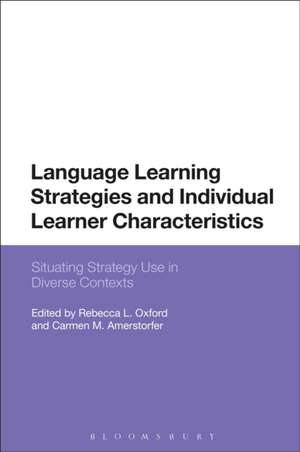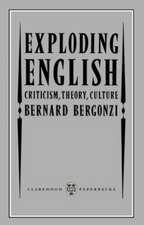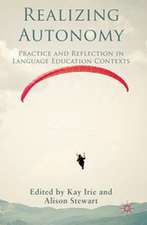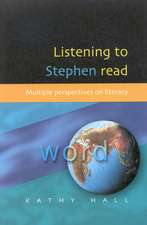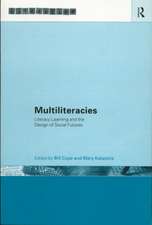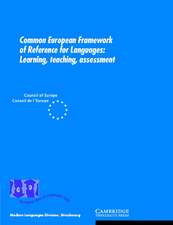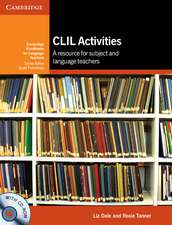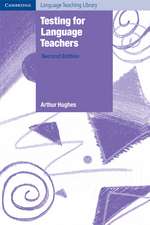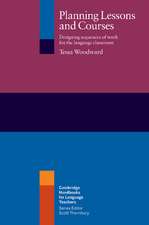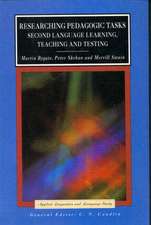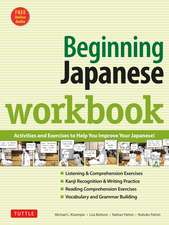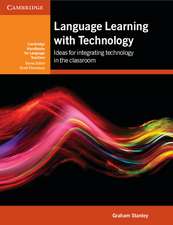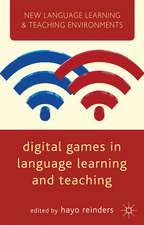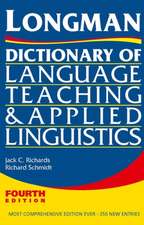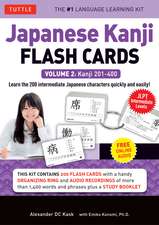Language Learning Strategies and Individual Learner Characteristics: Situating Strategy Use in Diverse Contexts
Editat de Rebecca L. Oxford, Carmen M. Amerstorferen Limba Engleză Hardback – 21 feb 2018
| Toate formatele și edițiile | Preț | Express |
|---|---|---|
| Paperback (1) | 233.81 lei 6-8 săpt. | |
| Bloomsbury Publishing – 21 aug 2019 | 233.81 lei 6-8 săpt. | |
| Hardback (1) | 779.09 lei 6-8 săpt. | |
| Bloomsbury Publishing – 21 feb 2018 | 779.09 lei 6-8 săpt. |
Preț: 779.09 lei
Preț vechi: 1116.05 lei
-30% Nou
Puncte Express: 1169
Preț estimativ în valută:
149.10€ • 161.90$ • 125.24£
149.10€ • 161.90$ • 125.24£
Carte tipărită la comandă
Livrare economică 22 aprilie-06 mai
Preluare comenzi: 021 569.72.76
Specificații
ISBN-13: 9781350005044
ISBN-10: 1350005045
Pagini: 352
Dimensiuni: 156 x 234 mm
Greutate: 0.82 kg
Editura: Bloomsbury Publishing
Colecția Bloomsbury Academic
Locul publicării:London, United Kingdom
ISBN-10: 1350005045
Pagini: 352
Dimensiuni: 156 x 234 mm
Greutate: 0.82 kg
Editura: Bloomsbury Publishing
Colecția Bloomsbury Academic
Locul publicării:London, United Kingdom
Caracteristici
Introduces concept of the 'learner-context ecosystem', in which the strategic, self-reflective learner is not just pushed and shaped by the environment but also has the ability to help mould that environment
Notă biografică
Rebecca L. Oxford is Professor Emerita and Distinguished Scholar-Teacher at the University of Maryland, USA.Carmen M. Amerstorfer is Senior Scientist at Alpen-Adria-Universität Klagenfurt, Austria.
Cuprins
Preface Introduction: The State of the Art in Language Learning Strategies and Individual Learner Characteristics, Rebecca L. Oxford (University of Maryland, USA) and Carmen M. Amerstorfer (Alpen-Adria University Klagenfurt, Austria) Part I: Theoretical Foundations of Individuals' Situated, Self-Regulated Language Learning Strategies Introduction to Part I 1. Understanding Language Learning Strategies in Context: An Innovative, Complexity-based Approach, Rebecca L. Oxford (University of Maryland, USA), Roberta Z. Lavine (University of Maryland, USA), and Carmen M. Amerstorfer (Alpen-Adria University Klagenfurt, Austria) 2. Moving from Theory to Practice: A Closer Look at Language Learner Strategies, Andrew D. Cohen (University of Minnesota, USA) 3. How Individual Differences Relate to Successful Strategy Use: A Holistic View of Self-regulated Language Learners round the World, Carol Griffiths (Fatih University, Turkey) Part II: Research Methodologies for Exploring Learning Strategies and Individual Differences Introduction to Part II 4. Listening to Highly Anxious EFL Learners through the Use of Narrative: Metacognitive and Affective Strategies for Learner Self-regulation, Christina Gkonou (University of Essex, UK) 5. Modelling a Prototypical Use of Language Learning Strategies: Decision Tree-based Methods in Multiple Context, Atsushi Mizumoto and Osamu Takeuchi (Kansai University, Japan) 6. Mixing Methods: Investigating Self-regulated Strategies in a Cooperative EFL Learning Environment, Carmen M. Amerstorfer (Alpen-Adria University Klagenfurt, Austria) Part III: Studies of Learning Strategies Emphasizing Diverse Contexts and Individual Difference Factors Introduction to Part III 7. Making Language Learning Strategies Research Useful: Insights from China for the World, Peter Yongqi Gu (Victoria University, New Zealand) 8. Language Learning Strategies of Greek EFL Primary and Secondary School Learners: How Individual Characteristics Affect Strategy Use, Angeliki Psaltou-Joycey (Aristotle University of Thessaloniki, Greece) and Zoe Gavriilidou (Democritus University of Thrace, Greece) 9.The Use of Pronunciation Learning Strategies in Form-focused and Meaning-focused Activities: The Impact of Contextual and Individual Difference Variables, Miroslaw Pawlak (Adam Mickiewicz University, Poland) Part IV: Preparing Teachers and Presenting Strategy Instruction to Learners Introduction to Part IV 10. Preparing Teachers for Language Learning Strategies Instruction in Diverse Classrooms: A Program for New Teachers, Anna Uhl Chamot (George Washington University, USA) 11. Investigating English Majors' Affective Strategy Use, Test Anxiety, and Strategy Instruction: Contextual Influences, Jakub Bielak and Anna Mystkowska-Wiertelak (Adam Mickiewicz University, Poland) 12. Young Language Learners in Classroom Contexts: The Development of Strategy Assessment Methods and Tools, Pamela Gunning (Concordia University, Canada) and Carolyn E. Turner (McGill University, Canada) Conclusion: Lessons Learned and the Future of Situated Learning Strategies, Carmen M. Amerstorfer (Alpen-Adria University Klagenfurt, Austria) and Rebecca L. Oxford (University of Maryland, USA) Index
Recenzii
This collection represents the future for language learning strategy (LLS) research, building on solid theoretical foundations but looking ahead to new directions for the field. Drawing on a diverse set of studies and contexts, the chapters elaborate on our understanding of the critical role strategies play in language learning processes and how LLSs interconnect with many personal and contextual factors. While offering valuable theoretical, methodological, and empirical insights, it also impressively manages to keep the discussions connected to practice. This collection will be pivotal in defining future directions for the field and helping us to better appreciate the ways in which LLSs contribute to and connect with language learning processes.
With publication of this landmark volume, language learning strategies are fully established on the cutting edge of language teaching and research. It marks an evolution in the field from the conceptualization and applications of strategies to innovative research designs. The text features eminent researchers along with emerging voices that are taking the work on strategies in exciting new directions. The chapters will re-shape how students, teachers, researchers, and policy-makers think about strategies for language learning.
An excellent resource for language learning researchers and teachers alike. It helps clarify critical methodological issues for researchers. It also provides practical pedagogical ideas for teachers to enhance language learners' strategic learning capacity.
A highly readable, insightful, and innovative book for teachers and researchers interested in language learning strategies and individual learner characteristics. Its careful editing and global reach make the book an invaluable compendium for an international readership.
Oxford and Amerstorfer 'walk their talk' as they contextualize language learning strategy use and self-regulation in a dynamic approach and deliver a volume that does not shy away from such complexity. Their contributors hail from a myriad of different countries, are both seasoned and up-and-coming, and address theory, practice, research and assessment from both tried-and-true as well as innovative mindsets. This book is a must-have for all language practitioners!
[This book] provides a current research foundation on language learners' strategy use. One great strength of this publication is that the contributors include both internationally recognized researchers of language learning strategies, including names that everyone will recognize (for example Chamot, Cohen, Oxford, Griffiths, and Gu), along with a cast of newer researchers whose names will soon be synonymous with language learning strategy research. The book provides all language teaching professionals interested in strategy-based research a current perspective of classroom applications and research ideas for the use of language learning strategies in a wide variety of learning contexts.
With publication of this landmark volume, language learning strategies are fully established on the cutting edge of language teaching and research. It marks an evolution in the field from the conceptualization and applications of strategies to innovative research designs. The text features eminent researchers along with emerging voices that are taking the work on strategies in exciting new directions. The chapters will re-shape how students, teachers, researchers, and policy-makers think about strategies for language learning.
An excellent resource for language learning researchers and teachers alike. It helps clarify critical methodological issues for researchers. It also provides practical pedagogical ideas for teachers to enhance language learners' strategic learning capacity.
A highly readable, insightful, and innovative book for teachers and researchers interested in language learning strategies and individual learner characteristics. Its careful editing and global reach make the book an invaluable compendium for an international readership.
Oxford and Amerstorfer 'walk their talk' as they contextualize language learning strategy use and self-regulation in a dynamic approach and deliver a volume that does not shy away from such complexity. Their contributors hail from a myriad of different countries, are both seasoned and up-and-coming, and address theory, practice, research and assessment from both tried-and-true as well as innovative mindsets. This book is a must-have for all language practitioners!
[This book] provides a current research foundation on language learners' strategy use. One great strength of this publication is that the contributors include both internationally recognized researchers of language learning strategies, including names that everyone will recognize (for example Chamot, Cohen, Oxford, Griffiths, and Gu), along with a cast of newer researchers whose names will soon be synonymous with language learning strategy research. The book provides all language teaching professionals interested in strategy-based research a current perspective of classroom applications and research ideas for the use of language learning strategies in a wide variety of learning contexts.
